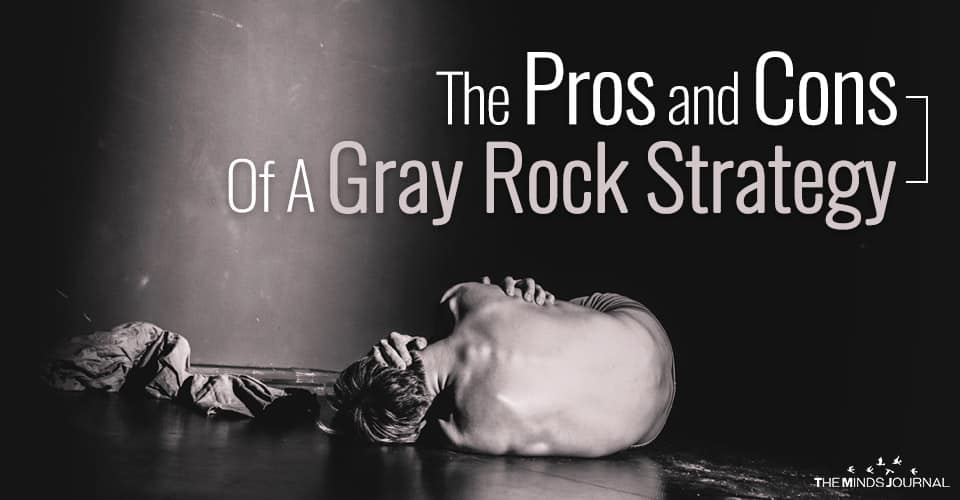One strategy for dealing with a narcissist or sociopath is to act like a “gray rock”, meaning that you become uninteresting and unresponsive.
You don’t feed their needs for drama or attention. You don’t show emotion, say anything interesting, or disclose any personal information. Nor do you ask questions or participate in conversations, except for brief factual replies. Limit your answers to a few syllables, a nod, or say “maybe” or “I don’t know.” Additionally, you may have to make yourself plain and unattractive, so your partner gains no pleasure in showing you off or even being seen with you.
This maneuver removes a narcissist of his or her “narcissistic supply.”For sociopaths and borderline personalities, you deprive them of drama.
You become so boring that the other person loses interest in you and will look elsewhere to get their needs met. Even if you’re accused, you might agree or say nothing. Your nonresistance makes it harder for them to project onto you. The idea is to blend into the background, like a gray rock.
When to be a Gray Rock
Gray Rock is the most effective in work and dating relationships or when co-parenting after separation with the goal of being left alone. In marriages, your spouse may not want a divorce for a variety of reasons. Even if you no longer want or expect love from your spouse yet want to stay married, be prepared for him or her to get needs met outside the marriage. Consider how you will feel if your spouse openly takes a lover. Not reacting to adultery gives permission to your spouse to “have his (or her) cake and eat it too.” On the other hand, if you want to break up or escape a hovering narcissist or sociopath, they will soon tire of your lack of response and leave you alone.
Risks of Going Gray Rock
In “Do’s and Don’ts in Confronting Abuse,” I explain why typical responses to abusers, such as explaining, arguing, and placating, are counterproductive. Going gray rock is also not without risks. Be forewarned that if you want more attention and love from a narcissist, this tactic will drive them away. Moreover, abusers will up the ante to elicit a response from you to regain control and reassure themselves that you have feelings for them. It’s essential that you practice detachment and not respond to anger, putdowns, outrageous accusations, slander, or jealous provocations. Like children having a tantrum, once you give in and react, they believe they have the upper hand. However, if you’re persistent, in time, they’ll tire of not getting a reaction.
If you’re with a violent partner, you may be in harms’ way whether or not you react, because violent abusers don’t need an excuse to take out their rage on you. They may easily manufacture unfounded justifications. It’s better to confront abuse, set boundaries, and take steps to protect yourself.
The Hidden Danger of a Gray Rock Strategy
There is a hidden risk to this strategy that is not often mentioned, but I’ve witnessed it with clients who have practiced it living with a narcissist for some years. You risk losing connection to your feelings, wants, and needs. Like anyone walking on eggshells in a relationship, you’re suppressing your thoughts and feelings. By not expressing yourself, you become alienated from your real self. This can be traumatic. Beware that you don’t become depressed and withdraw in other relationships.
Being a gray rock requires you to suppress your natural needs for love, attention, love, companionship, empathy, sex, and affection. As you become more invisible, your behavior feeds codependency. Rather than become more assertive, you may be replaying your childhood drama. It may be a re-traumatization of how you felt growing up if your needs and feelings were ignored. This tactic is based upon self-denial and self-sacrifice and isn’t the best strategy to feel safe and get your needs met.
If you’re able to break up or divorce and go no contact, that is a far better option. If you’re unable to do that for emotional reasons, examine your vulnerability to getting drawn back in. Are you still hoping for love and commitment from this person? (See “How to Tell if a Narcissist Loves You.”) If so, deep yearnings will sabotage your gray rock performance. It’s better to work with a counselor on letting go.
Unless you’re not cohabiting and unequivocally want to leave and not interact with your partner (except to co-parent or to minimally interact for work), this is a risky tactic to attempt long term. It’s far better to set effective boundaries on bad behavior and learn strategies to get your needs met as described in Dealing with a Narcissist. Then you can ascertain whether your relationship can improve or whether it’s best to leave.
©Darlene Lancer 2019
Written by Darlene Lancer
Originally appeared on WhatIsCodependency.com
You may also like:
How to Use the Gray Rock Method (Safely) In Dealing With Toxic Relationships
How To Deal With A Narcissist In Your Life – A Brief Guide
Dealing with Toxic Family Members: Narcissistic Abuse Recovery
Toxic Coworkers: Dealing With 7 Most Dangerous Work Personalities
Narcissists, Flying Monkeys, and Smear Campaigns: How To Deal With It










Leave a Reply